2016 年云南昆明理工大学翻译硕士英语考研真题 A 卷
Part Ⅰ Vocabulary and Structure
In this section, there are thirty incomplete sentences. For each sentence four
alternativesaregiven.DecidewhichofthealternativesA,B,CorDbestcompletes
the sentence. Write the appropriate letter on the ANSWER SHEET.
( 30 points,1 for each )
1. It is important to boost the morale of the soldiers as low morale can render
an army_______.
A. impotent
B. disabled
C. sterile
D. barren
2. The Jacksons are shocked by the manager’s _______indifference to the sufferings
of the poor workmen.
A. fragrant
B. festering
C. flagrant
D. ignorant
3. After the eruption of the volcano there was a serious _____ of typhoid in the
area.
A. outrage
B.
outcome
C. outbreak
D. output
4. The proposal was carried by a narrow _______.
A.
He seemed to have a (an) _______ of reasons not to take part in our research
D. fringe
B. margin
C. rim
verge
5.
project.
A. profusion
B. multitude
C. abundance
D. pack
Martin is considered one of the geniuses in our school but I think his paintings
6.
are quite ______.
A. mediocre
B. medium
C. moderate
D. meager
7 .The soldiers in the platoon shined their bayonets in _______ of the inspection
by the general.
A. contemplation
B. preconception
C. anticipation D. meditation
8. My woolen sweater used to be bigger than this. It has ______ in the wash.
A. shrunk
B. shortened
C. reduced
D. lessened
9. Do you see __________ with James Degnan's point of view?
A. back to back
B. eye to eye
C. face to face
D. heart to heart
10. John was sentenced to three months’ imprisonment because he tried to _____
taxes by falsifying his returns.
A. avoid
C. dodge
B. escape
we shall go out for a picnic on Monday
D. evade
11. ________,
A. Weather permits
B. Weather permitted
C. Weather permitting
D.
With weather to permit
12. We think ________ possible for them to fulfill their task in a few weeks..
A. it
B. that
C. what
D. this
13. Not until the game had begun ________ at the sports ground.
A. should he have arrived
C. did he arrive
B. had he arrived
D. would he had arrived
14. There used to be a theater here years ago, ________.
�
A. didn’t it
B. usedn’t it
C. didn’t there use to
D.
didn’t there
15. With all the children ________ at home during the holidays, she had a great
deal of work to do.
A. be
B. were
C. been
D. being
16. The dying soldier had the message ________ straight to the headquarter.
A. be sent
B. being sent
C. sent
D. to be sent
17. How close parents are to their children ________ a strong influence on the
character of their children.
B. have
D. to have
C. has
A. having
18. There’s
A. no knowing
_________ when we shall meet again.
C. not to know
B. not know
D. never knowing
19. One of the requirements for a fire is that the material ________ to its burning
temperature.
A. heated
B. be heated
C. to be heated
D. being heated
20. Kunming is usually cool in the summer, but Shanghai ________.
A. is rarely
B. is hardly
C. rarely is
D. hardly is
21. All living creatures have some ______ that are passed on from one generation
to the next.
A.
aspects
B. attributes
C. properties
D. faculties
22. The lovely damsel of the court could not _______ the temptation of throwing
glances of admiration upon the handsome young man.
A. resist
B. obstruct
C. conflict
D. challenge
It is hoped that the person on trail will be released through the _____ of
23.
the king’s daughter.
A. interruption
meditation
B.
interrogation
C. intervention
D.
24. When they were evicted for not paying the rent, they wept, wailed, and _________
their teeth.
A. bit
B. chewed
C. gnashed
D. munched
25. Mr. Bright _______ down the stairs, trying not to disturb his roommates, but
a creaking floorboard woke up his best friend, Tom.
A. tiptoed
C. trudged
B. limped
D. strutted
26. Betty liked to have her clothes made to ______ but I preferred ready-made
clothes.
A. medium
B. measurement
C. standard
D. measure
27. The whole area of national and local governments was subjected to a thorough
financial_______ , and inefficiency and waste were attacked.
A. survey
B. search
C. research D. scrutiny
28. In my younger and more _______ years my father gave me some advice that I’
ve been turning over in my mind ever since.
A. frail
C. assailable
B. pregnable
D. vulnerable
29. Formulated in 1823, the Monroe Doctrine________ that the Americas were no longer
open to European colonization.
�
A. argued
B. asserted
C. entreated
D. accentuated
30. As we all know, houses are __________ to be at rest with respect to the earth
but the earth itself is not motionless .
A. resumed
B. consumed
C. assumed
D. presumed
Reading Comprehension ( 40 points )
Part II
SectionA:Inthissection,therearethreepassages.Eachpassageisfollowedby
somequestionsorunfinishedstatements. Foreachofthem there are fourchoices
marked A, B, C and D. You should decide on the BEST choices and then write the
appropriate answer on the ANSWER SHEET. ( 30 points,2 for each )
Passage 1
According to a recent publication of the Equal Employment Opportunity
Commission, at the present rate of progress, it will take forty-three years to end
job discrimination-hardly a reasonable timetable.
If our goal is educational and economic equity and parity, it is then we need
affirmative action to catch up. We are behind as a result of discrimination and
denial of opportunity. There is one white attorney for every 680 whites, but only
one black attorney for every 4,000 blacks; one white physician for every 659 whites,
but only one black physician for every 5,000 blacks; and one white dentist for every
1,900 whites, but only one black dentist for every 8,400 blacks. Less than 1 percent
of all engineers or of all practicing chemists is black. Cruel and uncompassionate
injustice created gaps like these. We need creative justice and compassion to help
us close them.
Actually, in the U.S. context, “reverse discrimination” is illogical and a
contradiction in terms. Never in the history of mankind has a majority, with power,
engaged in programs and written laws that discriminate against itself. The only
thing whites are giving up because of affirmative action is unfair advantage,
something that was unnecessary in the first place.
Blacks are not making progress at the expense of whites, as news accounts make
it seem. There are 49 percent more whites in medical school today and 64 percent
more whites in law school than there were when affirmative action programs began
some eighteen years ago.
In a recent column, William Raspberry raised an interesting question.
Commenting on the Bakke case, he asked, “What if, instead of setting aside 16 of
100 slots, we added 16 slots to the 100.” That, he suggested, would not interfere
with what whites already have. He then went on to point out that this, in fact,
is exactly what has happened in law and medical schools. In 1968, the year before
affirmative action programs began to get under way, 9,571 whites and 282 members
of minority groups entered U.S. medical schools. In 1976, the figures were 14,213
and 1,400 respectively. Thus, under affirmative action, the number of “white
places” actually rose by 49 percent; white access to medical training was not
diminished, but substantially increased. The trend was even more marked in law
schools. In 1969, the first year for which reliable figures are available, 2,933
�
minority-group members were enrolled; in 1976, the number was up to 8,484. But during
the same period, law school enrollment for whites rose from 65,453 to 107,064, an
increase of 64 percent. In short, it is a myth that blacks are making progress at
white expense.
Allan Bakke did not really challenge preferential treatment in general, for
he made no challenge to the preferential treatment accorded to the children of the
rich, the alumni and the faculty or to athletes or the very talented only to
minorities.
1. The author is for affirmative action __________.
A.
B.
C.
D.
because it will take 43 years to end job discrimination
because there is discrimination and denial of opportunity in the U.S.
if we aim at educational and economic equity and parity
when there is no reasonable timetable in the U.S.
to close the gap between the whites and the blacks in the
2. It requires ______
U.S.
A.
B.
C.
D. one black attorney for every 4,000 blacks
creative justice and compassion
a lot more black engineers and chemists
education and economic development
3. Blacks are not making progress at the expense of whites, according to the author,
because ________
A.
B.
C.
D.
there are 49 percent more white in medical school today already
what whites give up is only unfair advantage
there are 64 percent more whites in law schools today
whites, the majority in the U.S., will never discriminate against themselves
.
4. William Raspberry, while commenting on the Bakke case, suggests
________
A.
B.
C.
D.
to follow what has happened in law and medical schools.
to interfere with what whites already have.
to offer 84 slots to whites and 16 to blacks.
to offer 100 slots to whites and 16 to blacks.
5. According to the author, ________,
A. Blacks are not making progress at white expense.
B. Affirmative action is an effective way to end job discrimination.
C. The things whites are giving up because of affirmative action are necessary.
D. Under affirmative action, white access to medical training was diminished.
Passage 2
I have observed that the Americans show a less decided taste for general ideas
than the French. This is especially true in politics.
Although the Americans infuse into their legislation far more general ideas than
the French, and although they strive more than the latter to adjust the practice
of affairs to theory, no political bodies in the United States have ever shown so
�
much love for general ideas as the Constituent Assembly and the Convention in France.
At no time has the American people laid hold on ideas of this kind with the passionate
energy of the French people in the eighteenth century, or displayed the same blind
confidence in the value and absolute truth of any theory.
This difference between the Americans and the French originates in several causes,
but principally in the following one. The Americans are a democratic people who
have always directed public affairs themselves. The French are a democratic people
who for a long time could only speculated on the best manner of conducting them.
The social condition of the French led them to conceive very general ideas on the
subject of government, while their political constitution prevented them from
correcting those ideas by experiment and from gradually detecting their
insufficiency; whereas in America the two things constantly balance and correct
each other.
It may seem at first sight that this is very much opposed to what I have said
before, that democratic nations derive their love of theory from the very excitement
of their active life. A more attentive-examination will show that there is nothing
contradictory in the proposition.
Men living in democratic countries eagerly lay hold of general ideas because
they have but little leisure and because these ideas spare them the trouble of
studying particulars. This is true, but it is only to be understood of those matters
which are not the necessary and habitual subjects of their thoughts. Mercantile
men will take up very eagerly, and without any close scrutiny, all the general ideas
on philosophy, politics, science, or the arts which may be presented to them; but
for such as relate to commerce, they will not receive them without inquiry or adopt
them without reserve. The same thing applies to statesman with regard to general
ideas in politics.
If, then, there is a subject upon which a democratic people is peculiarly liable
to abandon itself, blindly and extravagantly, to general ideas, the best corrective
that can be used will be to make that subject a part of their daily practical
occupation. They will then be compelled to enter into details, and the details will
teach them the weak points of the theory. This remedy may frequently be a painful
one, but its effect is certain.
Thus it happens that the democratic institutions which compel every citizen to
take a practical part in the government moderate that excessive taste for general
theories in polities which the principle of equality suggests.
6. Why do the Americans show less enthusiasm for general ideas than the French?
A. In America, the constitution provides checks and balances.
B. The French constitution did not allow for experiment.
C. The social conditions in France led to different ideas.
D. The Americans have always been in charge of their own public affairs.
Some
7.
because______.
people
in
different
democratic
countries
prefer
general
ideas
A. in politics it is easier to study general ideas
�
B. general ideas on different subjects are more interesting
C. they do not have time to address details.
D. mercantile men prefer general ideas on philosophy, politics, science and the
arts
8. What does the writer think would inhibit people’s preference for general ideas?
A. Teaching them the weak points of the theory.
B. Encouraging them to take a practical part in their daily work practice.
C. Trying to make them abandon those ideas.
D. Compelling them to study details.
9. The writer’s conclusion is that ________.
A. people’s taste for general ideas can be diminished through taking a practical
part in democratic institutions
B. general theories in politics should be the most important part of democracy
C. citizens should be forced to take part in democratic institutions
D. the principle of equality must be paramount
10. According to the passage, which of the following statements is true?
A. The Americans have a more decided taste for general ideas than the French.
B. The Americans introduce far more general ideas into their legislation than
the French.
C. Some political bodies in the United States have shown so much love for general
ideas as the Constituent Assembly and the Convention in France.
D. The political constitution condition of the French is helpful for the
correction of those ideas by experiment.
Passage
3
I have some difficulty in describing why I traveled to West Africa and what
I was doing there, since the journey that become so complicated and took me to so
many unexpected places seemed – in the beginning – to be so simple and so clearly
defined. I went to Africa to find the roots of the blues. It had always been obvious
that the blues sprang from a complex background, with much of it developing from
the music of the long period of African slavery in the United States and with some
of its harmonic forms and instrumental styles derived out of a broad European context.
It had always been just as obvious that there were certain elements in the blues
– in the singing style and in the rhythmic structures – that were not traceable
to anything in the countryside of the American South. These things, it seemed to
me, might have come from a distantly remembered African background, even if there
had been such a lengthy period between the break in contact with Africa and the
emergence of the blues in the 1890’s.
In the beginning I planned simply to record the tribal singers of West Africa
known as griots, since it was these musicians who seemed to come closest to what
we know as a blues singer. They are from tribes that had many people taken to the
southern states as slaves, and they usually sing alone, accompanying themselves
for the most part on plucked string instruments. Since most African music is
performed by village groups, and is often dominated by drumming, this practice in
�
itself is enough to set the groits apart. At the same time I hoped to collect from
the singers narrative accounts of the first encounters between the Africans and
the Europeans, told from the African viewpoint. I felt that this could give me a
clearer picture of one of the factors that had shaped the early Black experience
in the United States.
Before leaving for Africa I’d spent months taking notes on the tribal groups
and working with as much material on the griots as I could find. As I traveled I
had a definite idea of where I wanted to go, but at the same time I had not planned
the trip in anyway. I’ve always felt that to plan a trip too carefully is to make
sure you won’t find out anything you don’t already know.
I didn’t know, however, how much the simple trip I had begun would change
direction once I’d come to Africa, almost as if it took on a life and a will of
its own. I began to feel like someone who had bought a set of boxes that fit inside
each other in a wooden nest. When I opened one there was another inside it, and
inside that one was still another. I found so many boxes inside each other that
the simple project I had begun with became a series of new perceptions, each of
which was contained within the perception – the box – that I’d just opened.
Sometimes, as I sat on sagging beds engulfed in mosquito nets, the space around
me seemed to be filled with the myriad boxes of different sizes that my notebooks
and tapes had come to symbolize.
When I opened the box that was the music I’d come to record, I found that the
box inside was slavery itself. There was no way that I could work with the music
without taking into consideration how it had come to the United States. I also
realized that this was one of the reasons I had come to Africa. I was trying to
find traces of an experience, and not only that, I was looking for traces of an
experience that had occurred hundreds of years before. Would what I found have any
reality for me so many years afterwards?
I understand now that this complex set of questions had already been there in
my mind when I put the microphones and the tape recorded into my shoulder bag. I
had always tried to have some conception of the slavery that had brought people
from West Africa to the United States, even if I hadn’t seen, symbolically, that
when I opened the box decorated with pictures of musicians and instruments inside
it would be the next box, illustrated with old engravings of slave ships. I had
come to Africa to find a kind of song, to find a kind of music and the people who
performed it. But nothing can be taken from a culture without considering its
context.
11. The “singing style” and “ rhythmic structures” underlined in paragraph 1
is mentioned in order to ______.
A. discuss why the blues have remained popular through the years
B. identify aspects of the blues that present a historical enigma
C. argue that the American South had a profound influence on the musical structure
of the blues
D. praise the musical complexity of a little-known art form
�
12. The “narrative account” in paragraph 2 is viewed by the author primarily as
______.
A. offering a useful perspective on a complex historical situation
B. lending authenticity to an unusual form of music
C. contributing to a community’s sense of patriotism
D. exhibiting the versatile nature of an art from
13. The function of the first sentence in paragraph 4 (“I didn’t … own”) is
to ______.
A. indicate a significant turning point in the author’s research.
B. suggest that the author’s initial hypothesis lacked validity
C. reveal the author’s ability to adapt to a new environment
D. highlight the importance of the author’s thorough preparation.
14. In context, the reference to “notebooks and tapes” at the end of paragraph
4 primarily serves to ______.
A. illustrate the technology required by the author’s research
B. underscore the author’s growing awareness of the scope of the undertaking
C. suggest that few people appreciate the difficulty of writing historical
narratives
D. describe the author’s success in collecting data that supports oral history
15. The primary purpose of the passage is to describe the ______.
A. author’s theory about the origins of slave music in the American South
B. mental processes of a researcher considering an issue in music history
C. position of the griots in the musical culture of West Africa
D. various research techniques utilized by different musicologists
SectionB:Readthefollowingpassageandanswerthequestionsfollowedandwrite
your answers on the ANSWER SHEET. ( 10 points,2 for each )
There is an immense and justified pride in what our colleges have done. At the same
time there is a growing uneasiness about their product. The young men and women
who carry away our degrees are a very attractive lot—in looks, in bodily fitness,
in kindliness, energy, courage, and buoyancy. But what of their intellectual
equipment? That too is in some ways admirable; for in spite of President Lowell’
s remark that the university should be a repository of great learning, since the
freshmen always bring a stock with them and the seniors take little away, the fact
is that our graduates have every chance to be well informed, and usually are so.
Yet the uneasiness persists. When the uneasiness becomes clearly and distinctly
expressed, it takes the form of wishes that these attractive young products of ours
had more intellectual depth and force, more freedom from trouble and worry in dealing
with the different ideas, more of the firm, clear, quiet thoughtfulness that is
so potent and so needed a guard against besetting humbug and quackery. The complaint
commonly breaks itself up into a list of three particulars. Firstly, granting that
our graduates know a good deal, their knowledge lies about in fragments and never
gets welded together into the stuff of a tempered and mobile mind. Secondly, our
university graduates have been so busy studying a certain narrow and particular
�
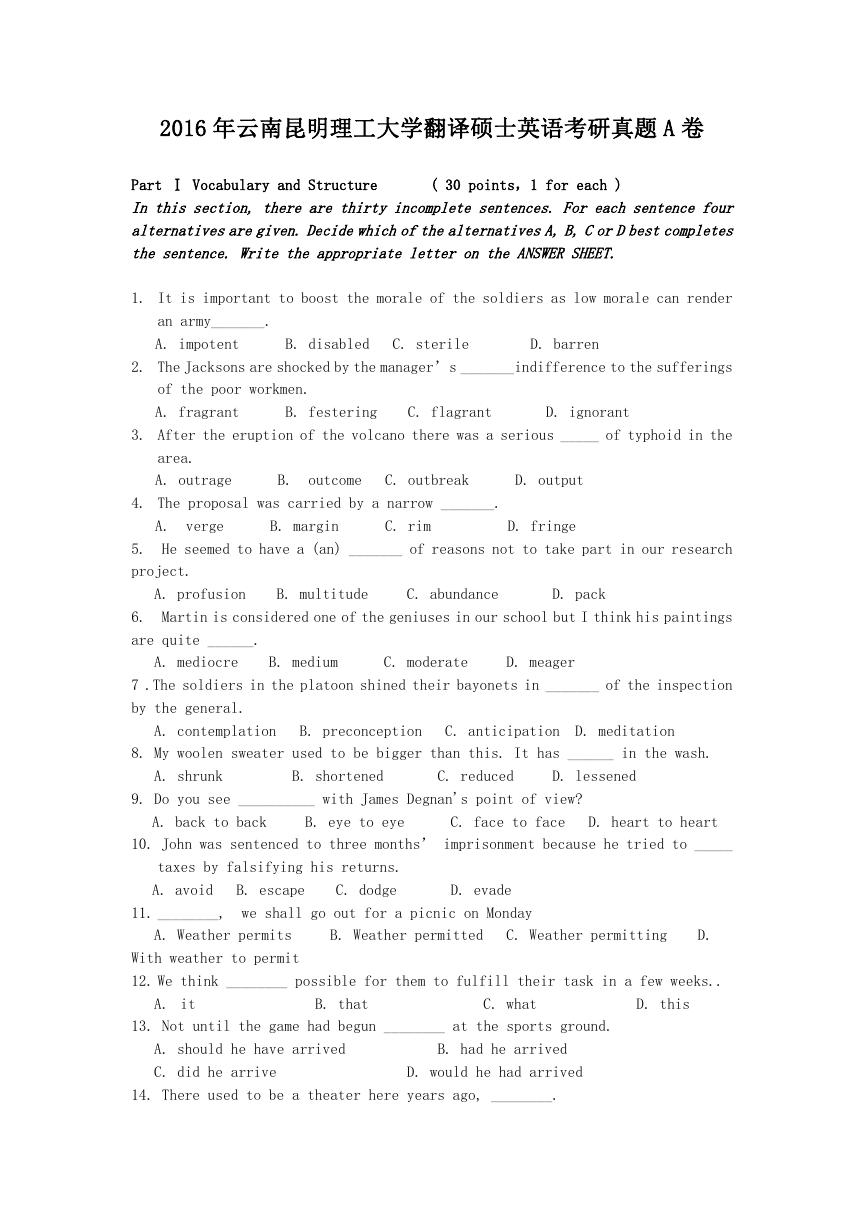
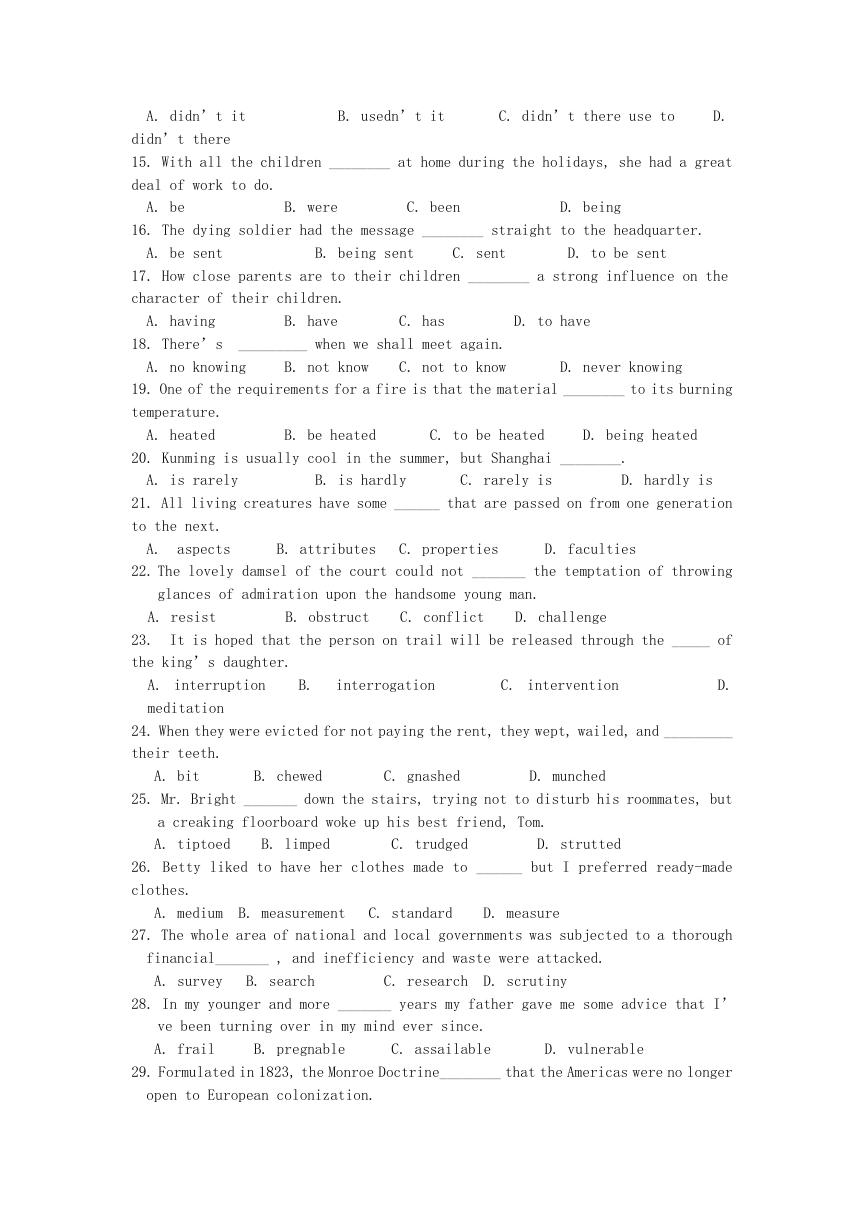
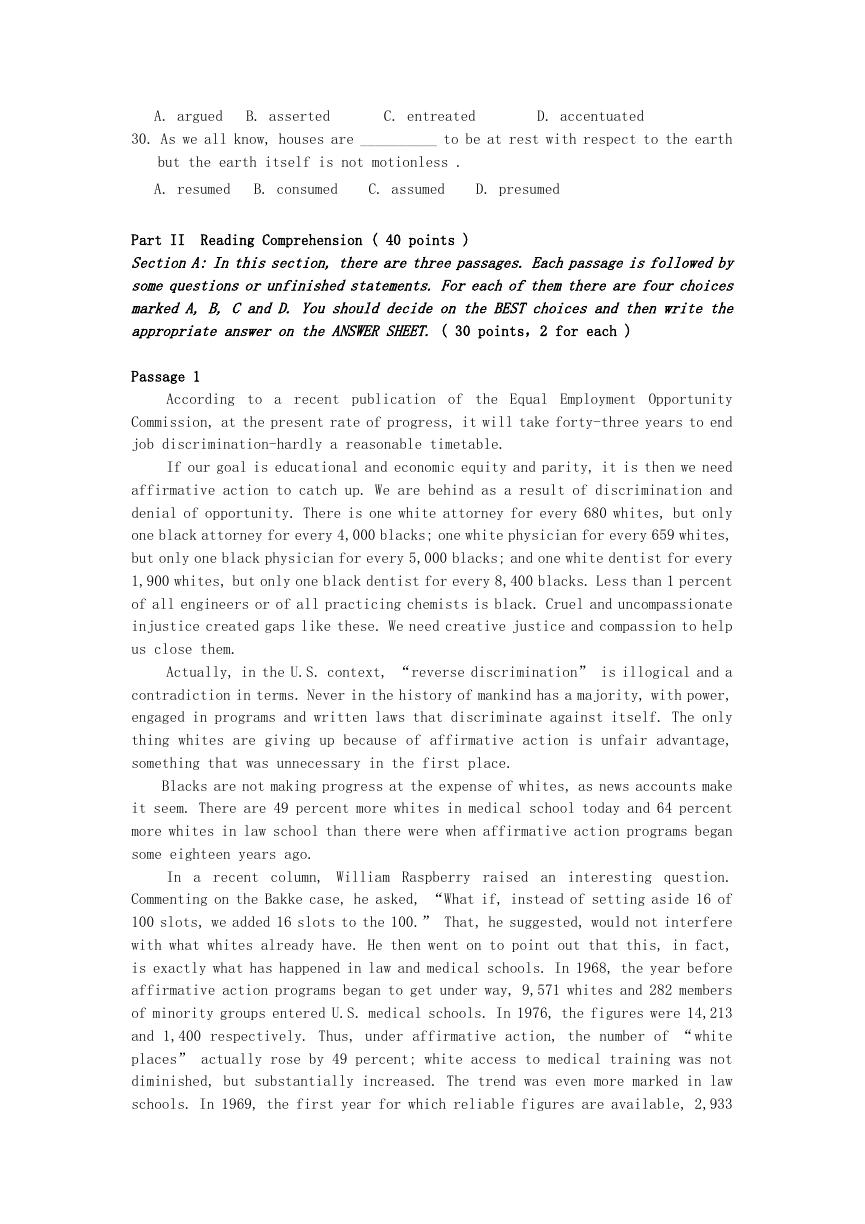
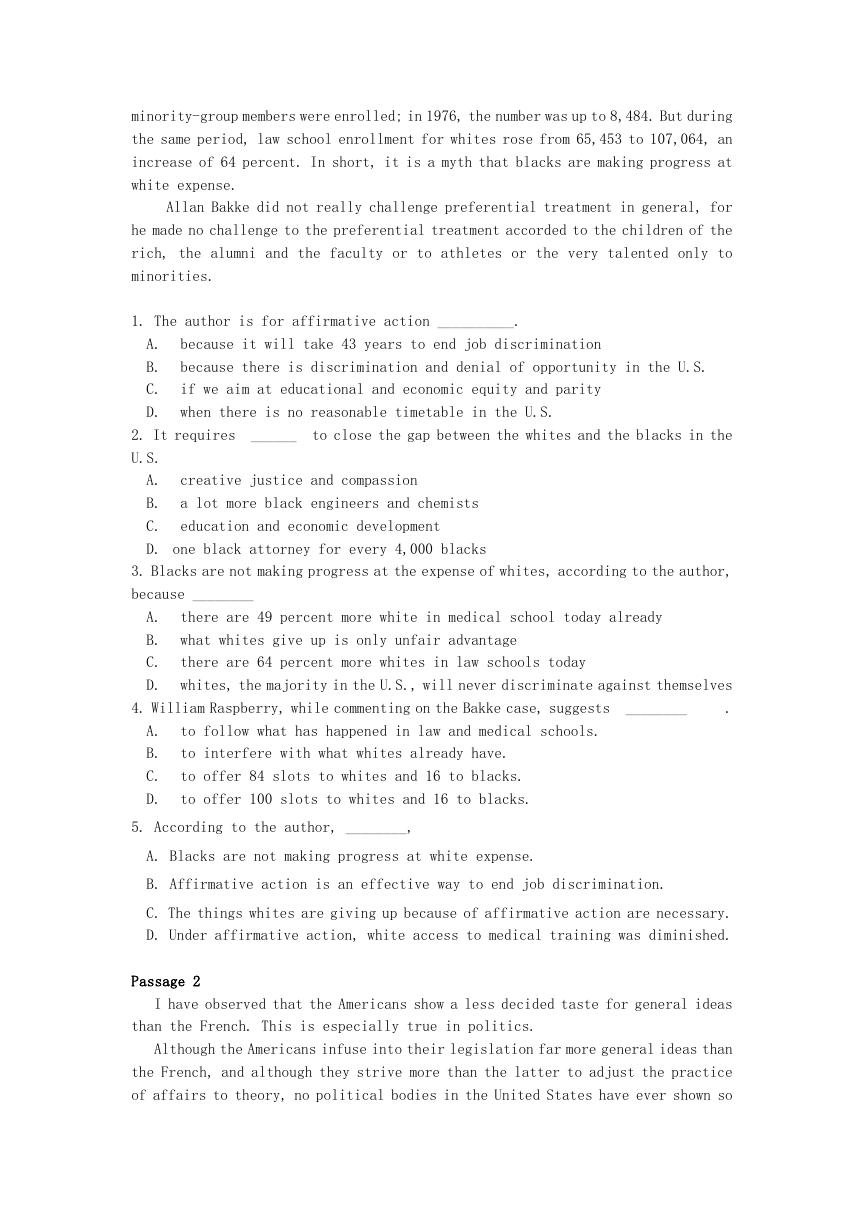
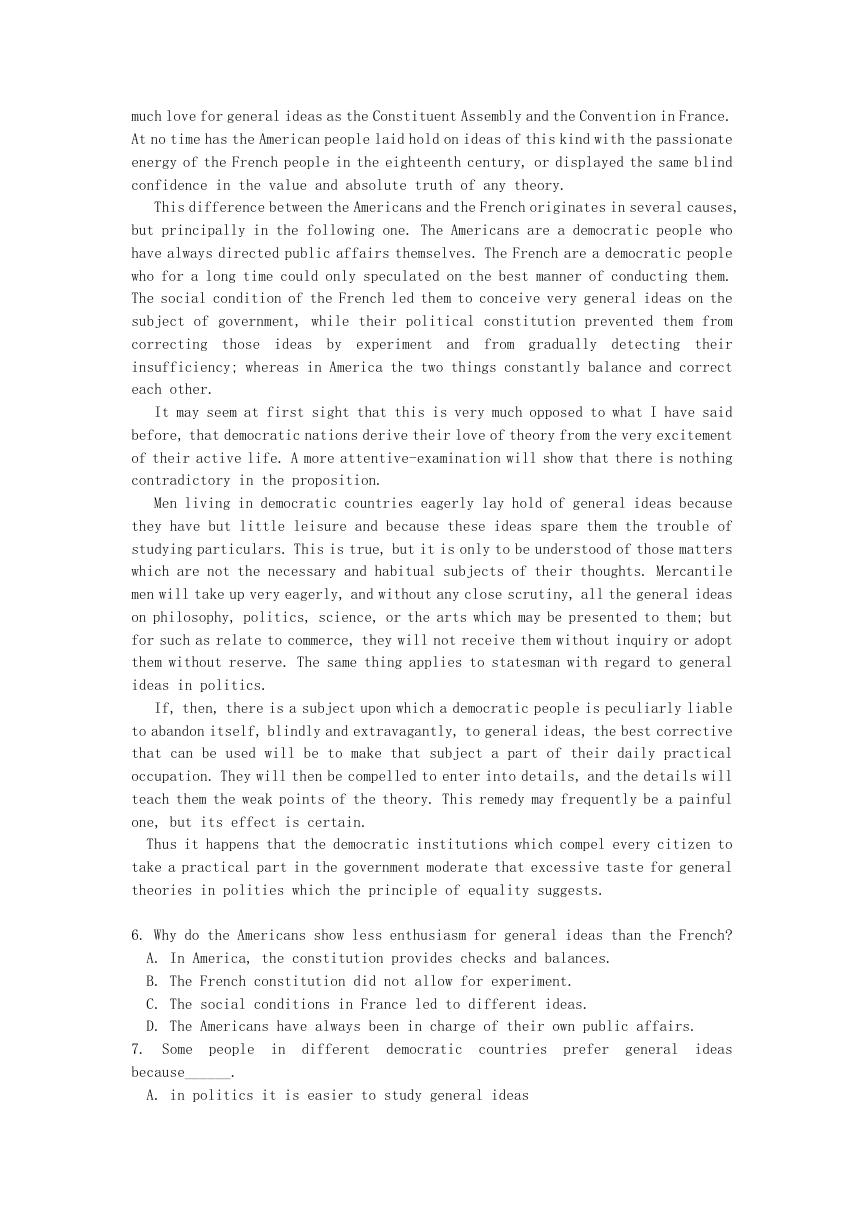
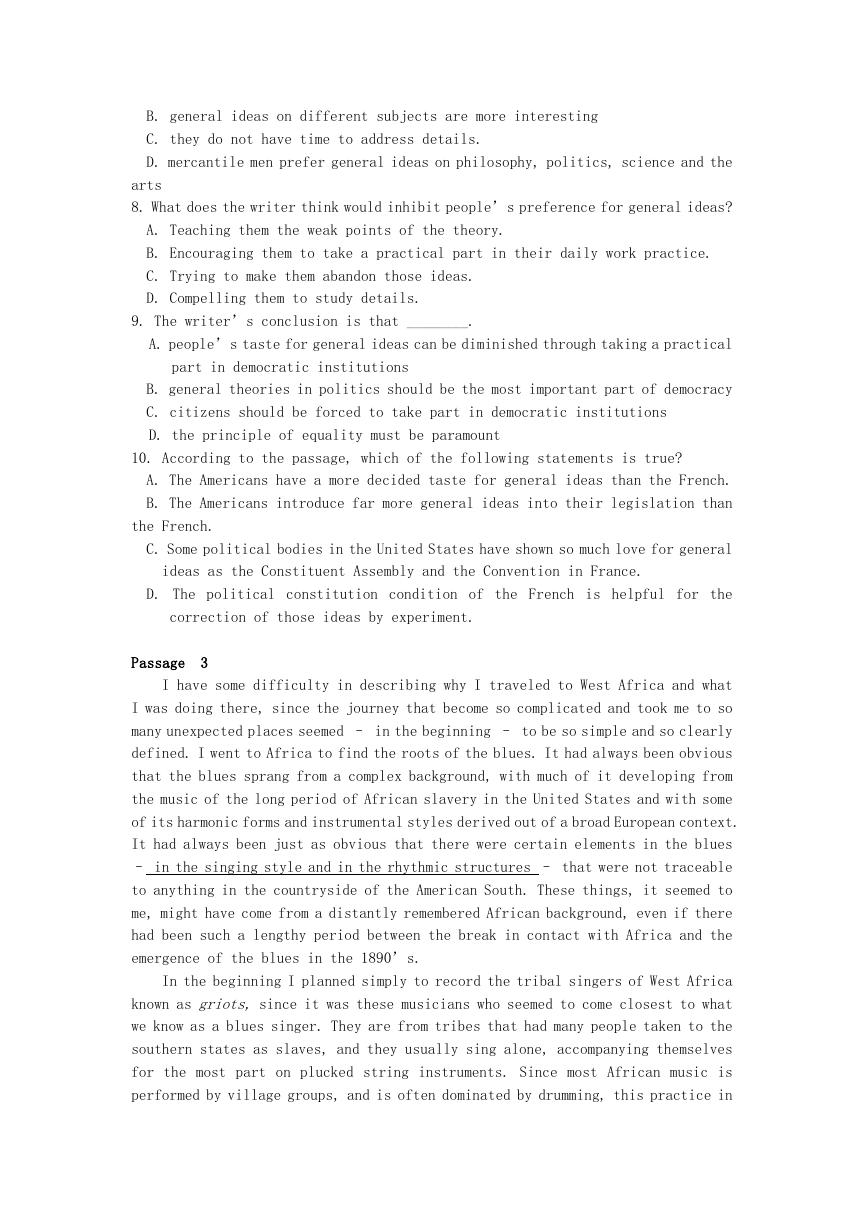
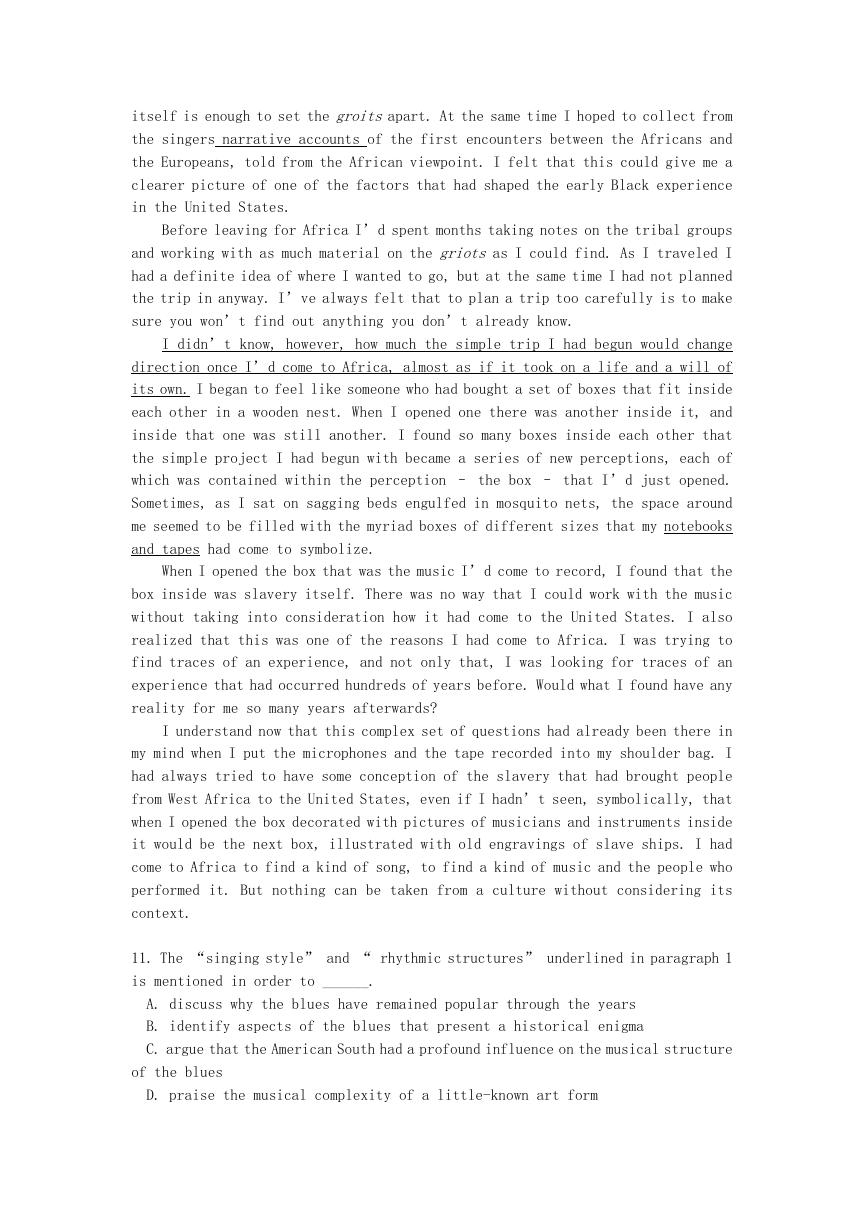
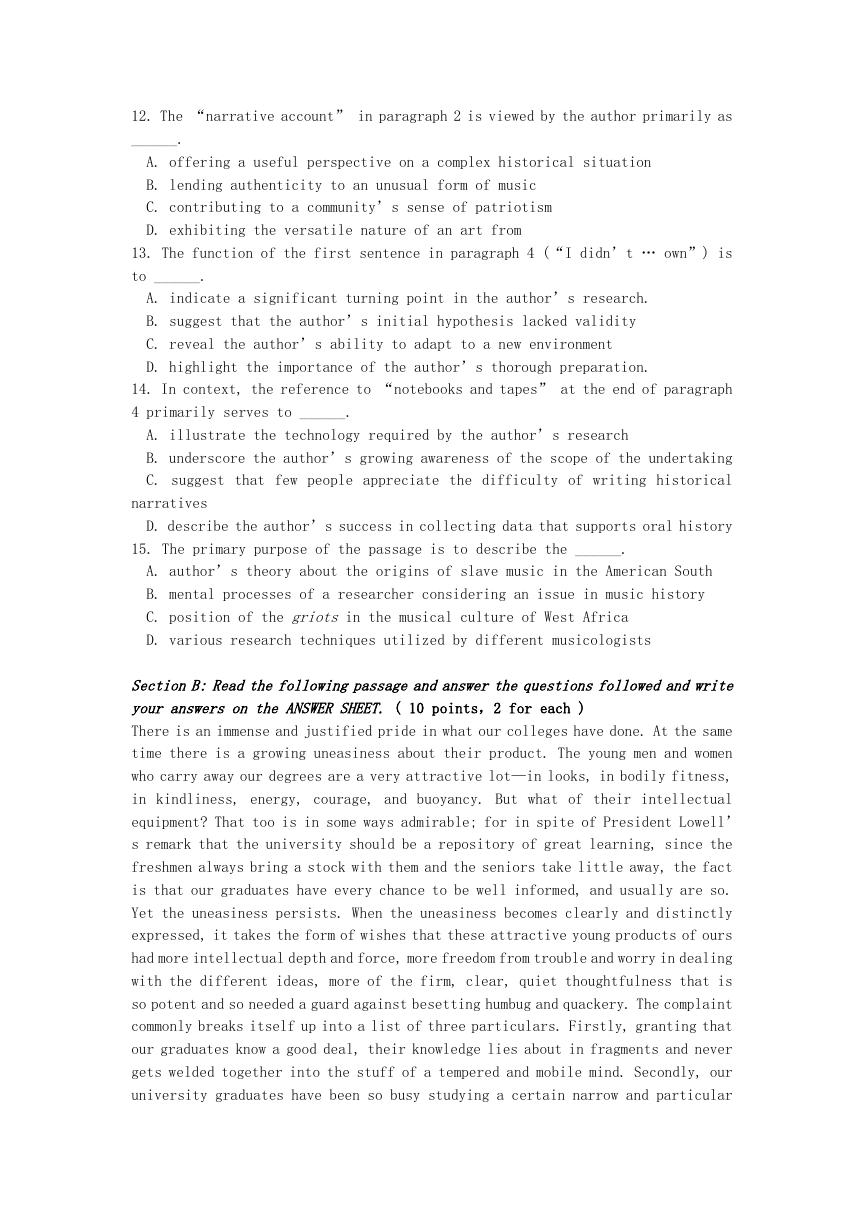








 2023年江西萍乡中考道德与法治真题及答案.doc
2023年江西萍乡中考道德与法治真题及答案.doc 2012年重庆南川中考生物真题及答案.doc
2012年重庆南川中考生物真题及答案.doc 2013年江西师范大学地理学综合及文艺理论基础考研真题.doc
2013年江西师范大学地理学综合及文艺理论基础考研真题.doc 2020年四川甘孜小升初语文真题及答案I卷.doc
2020年四川甘孜小升初语文真题及答案I卷.doc 2020年注册岩土工程师专业基础考试真题及答案.doc
2020年注册岩土工程师专业基础考试真题及答案.doc 2023-2024学年福建省厦门市九年级上学期数学月考试题及答案.doc
2023-2024学年福建省厦门市九年级上学期数学月考试题及答案.doc 2021-2022学年辽宁省沈阳市大东区九年级上学期语文期末试题及答案.doc
2021-2022学年辽宁省沈阳市大东区九年级上学期语文期末试题及答案.doc 2022-2023学年北京东城区初三第一学期物理期末试卷及答案.doc
2022-2023学年北京东城区初三第一学期物理期末试卷及答案.doc 2018上半年江西教师资格初中地理学科知识与教学能力真题及答案.doc
2018上半年江西教师资格初中地理学科知识与教学能力真题及答案.doc 2012年河北国家公务员申论考试真题及答案-省级.doc
2012年河北国家公务员申论考试真题及答案-省级.doc 2020-2021学年江苏省扬州市江都区邵樊片九年级上学期数学第一次质量检测试题及答案.doc
2020-2021学年江苏省扬州市江都区邵樊片九年级上学期数学第一次质量检测试题及答案.doc 2022下半年黑龙江教师资格证中学综合素质真题及答案.doc
2022下半年黑龙江教师资格证中学综合素质真题及答案.doc